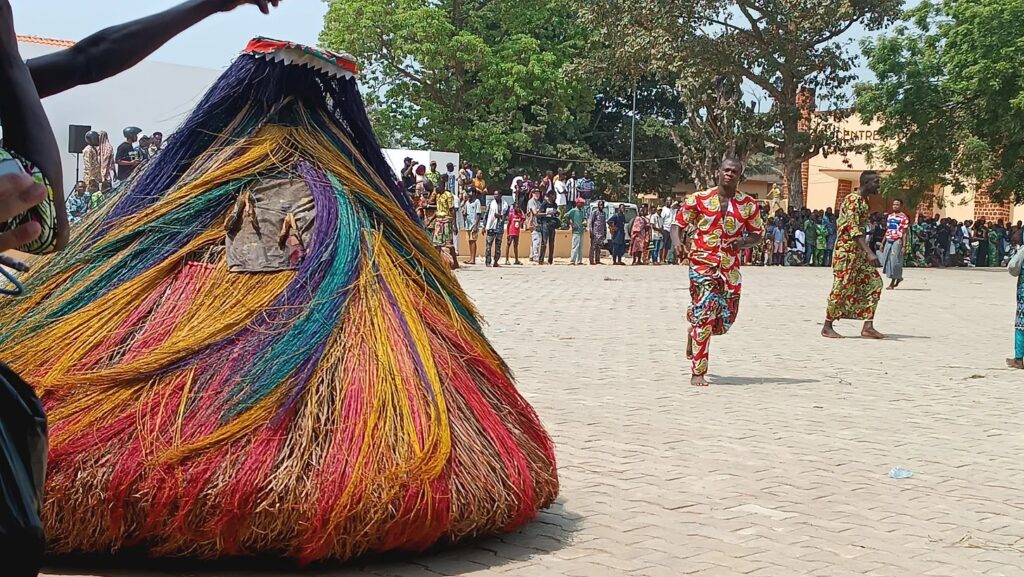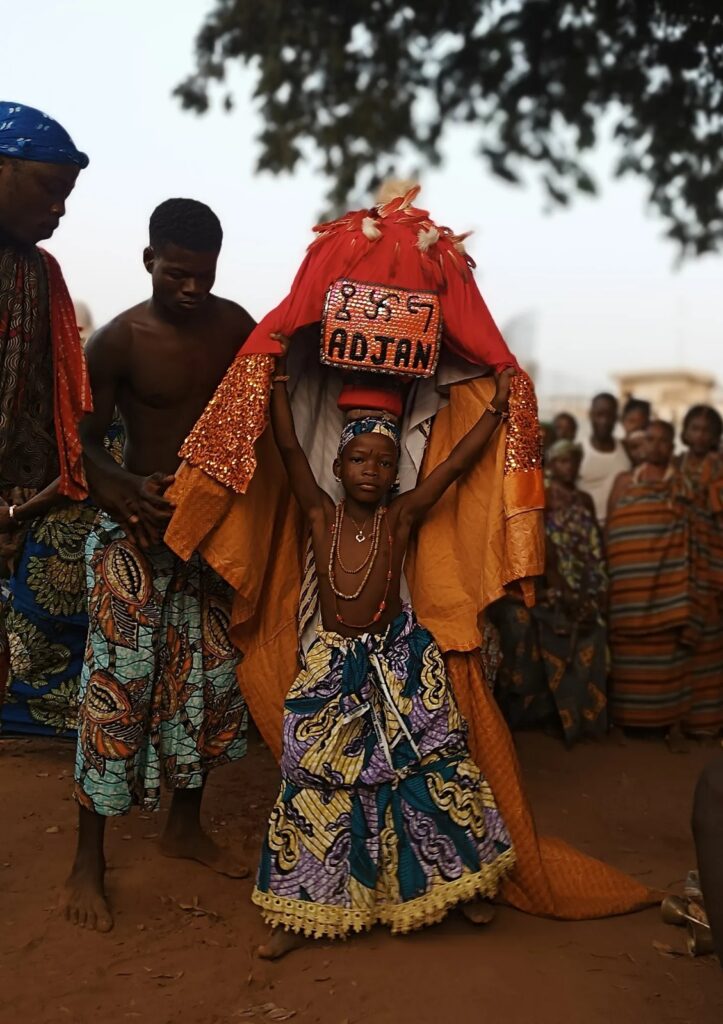I met with a witch in Accra, Ghana. This one, not your kind of village witch always dressed in black with two fallen tooth sitting in darkness, waiting until 3am to fly with a broomstick she inherited from her Queenmother.
No. This one attended the Accra Weizo Tourism Conference in full daylight, wrapped in elegance and ancient symbols. A walking museum dressed not for showmanship but for deep ancestral presence like one sent to go demand what they deserve on the stage of men.
Her attire hand-crafted kimono designed with Adinkra symbols, those sacred visual glyphs rooted in Akan philosophy. These symbols, far from decorative, are visual representations of concepts, proverbs, aphorisms, identity codes and prayers conveying deep philosophical and cultural meanings originating from the Akan people of Ghana and Cote d’Ivoire.
If there had been a “Best Dressed” award at Accra Weizo 2025, I would have handed it to her without question. She wore white on white as her base the spiritual color of purity and power overlaid with black-gold-green kimono inscribed with Adinkra. Her middle finger and wrist-bangle adorned with cowries one she would later announce as protection and attraction. She glowed.
Not in makeup nor glitters, but in the unmistakable aura of someone deeply in tune with the seen and unseen. Her voice soft yet powerful like the Patronus Charm. She walked with grace and class, smiles at everyone like the ice-cream man would smile at school children for patronage. Oh, she really did come prepared.
Dressed in spirits and symbols: Black for memories, Gold for power, Green for fertility, Cowries for protection and attraction.

Who says African spirituality can’t walk runways, speak in conferences or partner with tour operators?

Her name Adepa Sika Onyamekese, an African priestess, spiritual consultant and a strong advocate for African spiritual tourism.
Here comes the witch who boldly declared “I am proudly an African witch, unapologetically. I am a priestess and a witch. I pray through my ancestor not to my ancestors just like Christians would pray to their God through Jesus, the divine source.”
Assertive, opinionated, with voice that commands both spiritual and physical attention. Silently loud, she held the mic to speak, one question which threw the crowd off-balance.
“How do we look into spiritual tourism in Africa? How do we move our witchcraft from one place to the other just like people would go on pilgrimage and bring back holy water to Ghana?”
She wasn’t asking for acceptance. She was demanding recognition.
There was silence. Then stunned whispers. Then a slow, growing acknowledgment.
We were barely trying to recover from her bold identity declaration of being a proud WITCH when the above question hit us like a tsunami. “Spiritual tourism in Africa?”
Well, let’s not pretend. Spiritual tourism like every other facet of tourism has long been in practice but in coded form. 5 out of 10 people who travel for religious tourism and other type of tourism low-key travel for spiritual tourism visiting spiritual sites outside their practicing faith: Prayer Mountains and beaches for cleansing, consults a prophet, sneaks into a forest shrine, or enters a prayer house for deliverance.
Spiritual tourism is an aspect of cultural tourism that focuses on satisfying our spiritual needs and elements. It is a quest to find answers to deep happenings or reconnection with self which often result in spiritual consultations: visiting a prophet, priest, priestess, Alfa and sacred places. It also involves performing certain rituals, cleansing, abstinence, purifications, time-travel, divination, necromancer, seclusions or adherence to strict instructions solely religious instructions.
In the South Nigeria, we have prayer houses: ufok akam in Ibibio, ile adura in Yoruba and ulo epere in Igbo. These places serve the same function where people go for special prayers to seek spiritual solutions and answers. Ironically, some of these prayer houses are shrines (African spirituality) in a mask. They clothe themselves in sanctimonious reverence whereas in the real sense, they are African spiritual tourism hubs. We just don’t name them that way because “shrine” sounds taboo, “native” sounds primitive and African spirituality is too often dressed in shame, while others are wrapped in reverence.
But why do we really frown at shrines and temples in the real sense?


Applauding Benin Republic’s Spiritual Boldness
Driving through the smooth road of Grand-Popo to Aneho in Benin Republic, it is a common sight to see roadside signposts/billboards advertising the services of traditional priests and spiritual consultants often tagged as Babalawo. They offer various spiritual services from healing to wealth-making to future reading to self-discovery to spiritual alignment and what have you. They’re not hiding. They’re not apologizing.
They are spiritual tourguides of African mysticism like our conventional tourguides. They curate mind-blowing spiritual experience “tours” for seekers and wanderers, the destination is your soul’s quest. Of course, with some financial commitment.
Religious tourism and Spiritual tourism.
While both may sound similar, the act involved is different. The difference between religious tourism and spiritual tourism lies in the exclusiveness of the faith being practiced in both. For religious tourism, it is mostly people within the same faith who practice it e.g a Christians would visit the Holy land of Jerusalem, Israel; Muslims visit Mecca; Buddhist visits temples; Traditionalist visit shrines. Whereas, spiritual tourism welcomes all irrespective of their faith or devotion. It provides solace for wandering souls and most times, doesn’t seek to convert its “tourist”
In spiritual tourism, the end goal is finding solutions, answers, protection or unraveling mysteries. So, a Christian can consult a traditional priest. A Muslim may seek an herbalist. Just as King Saul in the Bible once consulted (necromancy) the Witch of Endor (1st Samuel 28), people today cross spiritual lines to find clarity, healing, or power.
Spiritual tourism welcomes the wandering soul, not just the faithful. It’s for those in search of understanding — of self-rejuvenation, growth, protection, of ancestry, of mysteries.
It includes: Rituals Cleansing. Seclusions. Time-travel. Necromancy. Soul journeys. Chants, dance-induced trances and teleporting.

The Witch’s Advocacy
So, what Onyamekese, the African Witch/Priestess at Accra Weizo conference is advocating for is a proper recognition and acceptance of the African Spirituality to be duly incorporated as an aspect of tourism. “How do we seamlessly move our Sango and all of that? People bring water from Israel into Ghana with no questions asked. They move it seamlessly. Why can’t mystics move with sacred items too? A lot of mystics who want to travel and come around as exhibitors to showcase their African spiritism are scared of doing so because we are seen as evil not to be associated with.”
“As a member of the Witch and Priestess practitioners, we have a well-structured spiritual system guiding our community. If I attempt any spiritual performance right now, I will be summoned before a disciplinary committee. We have order. We have ethics. We have boundaries. We have regulations guiding psychedelics just like every other tourism industry have.” These are necessary for spiritual gatekeeping and power checks and balance.
Tourism is not just physical there are spiritual components of it yet to be fully uncovered. African mysticism is a form of spiritual tourism just like necromancy, soul travel and yoga. It is the interconnectedness of the physical and spiritual realms through a medium of spirits, ancestors and elements of nature; Earth, Water, Fire and Air, which involves sacred rituals and practices to achieve. It bridges the gap between the spirit realm (unseen) and the physical world (seen).
Benin Republic is Leading, but Others Must Rise
Benin Republic is already one step ahead in the whole of West Africa. Every year in January, there are special days set aside for the celebration of Vodun (Voodoo) Festival. One which brings to the global stage African spirituality as a way of life to the Beniniose. It has become a global tourism festival where people from all around the world find their way to Ouidah, the headquarters of Voodoo in West Africa, to witness the festival. It’s not a scary cult rite. It’s a cultural showcase packed with complete with Dance to Trance, musical performances, initiations, ancestral celebrations and identity preservation. This is African spirituality as soft power for tourism, education, economic growth, and identity.

Why the Urgency Now?
Because African spiritual tourism is already happening.
Onyamekese is calling for a change. For partnerships with tour operators, for digital experiences, for repackaging what is already being consumed in silence. African Spirituality Tourism is not about flying on broomsticks or casting spell to inflict sickness and suffering on someone as being portrayed by Nollywood neither is it wrapped in fetish red and black piece of cloth thrown into a calabash or tied on a tree. It’s about: Healing in sacred groves. Dreaming in ancestral lands. Dancing into trances. Cultural preservation and reconnecting with one’s lost self. It is wrapped in understanding symbols etched into your cloth, your skin, your soul. It’s a return to roots — not to remain there, but to remember. It has its own business side to contribute to the growth of the economy.
“I have clients who comes for spiritual consultations and after the exercise, they would want to explore the city before travelling back to base. It is not in my place to take them touring because that is not my field. This is where we need networks of tour operators who we can collaborate with. I play my part, they play their part at the end of the day we all go back home with a smiling pocket.”
I quiet agreed with her on this.
So, whether you are sitting quietly in a forest shrine, time-travelling into the past and future through the present, listening to the rhythms of hums and chants for protection, looking for ways to tap from spiritual wealth or uncovering the mysteries of century-old hidden symbols, these experience invites one to reflect and connect to Africa’s deep spiritual root.
There is an urgent need for sensitization of the public especially people of other religions. African Spirituality tourism if well packaged could be the next hit face of tourism in Africa. After all, it is what is being practiced under the skin from our politicians seeking power and protection to our clergymen and women seeking magical powers for abracadabra, to desperate youths looking out for ways of making quick money. The underground consumption of African spiritual tourism is high. They just do it in secret.

Because public shame still cloaks African spirituality.
Here are a few sacred places for spiritual tourism: Ouidah in Benin Republic, Ife in Osun state, Nigeria, Tafi Atome village in Ghana, Bali in Indonesia.
Adepa Sika Onyamekese is not just an African Witch and Priestess she is one of the keepers of the Ncheche museum where African science is taught, priests are trained and spiritism is re-rooted.
And Lastly…
One final question lingers — one that made us all laugh and think at the same time:
One of us the participants threw a question at her
“Since you’re a witch, why did you use airplane as a means of transportation in attending this conference? Why not just do abracadabra disappear and reappear?”
Her answer?
A knowing smile.

”why do you Christians book flights and show passports? Why not walk on water like Jesus did or don’t you have faith?”
Oh now I remember, she was once a Christian before she retraced her steps back to her African root. In the end, we all went back with a lot to ponder on.

